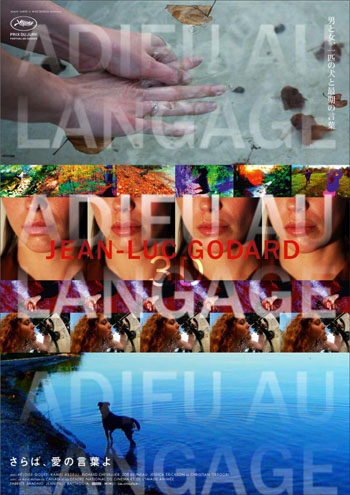Jean-Luc Godard‘s Goodbye to Language comes in at #1 on La Furia Umana‘s list of the top ten films of 2014. It’s Craig Keller‘s #1 as well, though his list is much shorter.
33 contributors to Twitch have voted up a top 20. #1: Richard Linklater‘s Boyhood, with “special notice to Patricia Arquette, who secretly owns this movie.”
“My list harbors no less than four films that must be considered, in and of themselves, outright acts of political resistance,” writes Michael Atkinson for In These Times. “You don’t come by such things everyday, and we may not have seen such an uptick since the late ‘60s.” His #1: Sergei Loznitsa‘s Maidan. “Enrapturing, devastating and always unemphatic, it’s an object lesson on how to capture history on film.”
“This was not a great year for film, particularly when compared to 2013,” finds Atlantic film critic Christopher Orr. “I’m not sure a single movie I saw would have cracked the top five of last year’s list.” His #1: A Most Violent Year. “Coming on the heels of Margin Call and All Is Lost, the movie establishes J.C. Chandor as perhaps the most talented American writer/director still operating largely beneath the public radar.”
The New York Review of Books gathers 20 reviews it’s run this year, including David Bromwich on Laura Poitras‘s Citizenfour, Zoë Heller on David Fincher’s Gone Girl, J. Hoberman on Stephanie Spray and Pacho Velez’s Manakamana, Geoffrey O’Brien on Jonathan Glazer’s Under the Skin, Francine Prose on Agnieszka Holland‘s Burning Bush and a nifty little entry on Michael Almereyda‘s Skinningrove.
In the new issue of the London Review of Books, Alan Bennett looks back on his 2014.
Staff members at BAMcinématek have posted their lists. Scroll through and you’ll find more than movies, too.
#1 for Dean Kavanagh: Maximilian Le Cain’s Damp Access.
#6 and #5 in J.R. Jones‘s countdown at the Chicago Reader: Rory Kennedy’s Last Days in Vietnam and Kelly Reichardt‘s Night Moves.
“In 2014, franchises are not a big part of the movie business. They are not the biggest part of the movie business. They are the movie business.” That’s Mark Harris in a piece for Grantland that’s been widely cited in general but also in at least two year-end wraps, Glenn Kenny‘s and Wesley Morris‘s.
The New Yorker‘s Richard Brody isn’t buying into the argument: “Movies are wilder, more daring, more original than ever. In the age of Harris’s nostalgia, there might not have been superhero films that wore the name of their franchise brand in the title—but there would also never have been anything as daring and original as To the Wonder or The Grand Budapest Hotel or The Wolf of Wall Street or Somewhere. The studios are unchained—and so are the directors and the independents. Perhaps Louis B. Mayer would never have made Furious 7; he would never have made The Tree of Life, either. And these are higher-budget independents; those who work on extremely low budgets make movies, such as An Oversimplification of Her Beauty and Butter on the Latch, of an astonishing, surpassing audacity and originality.”
Miguel Branco offers a shot by shot breakdown of Cinefile 2014
“The essential film book of this or almost any year is The Essential Raymond Durgnat, edited by Henry K. Miller and published by the British Film Institute,” writes Adrian Martin at the top of his new World Wide Angle column for De Filmkrant.
“What does it mean to attend 26 film-festivals—for a minimum of three days apiece, usually twice and sometimes even thrice that length of time—in a calendar year?” asks Neil Young in the Notebook. “It meant that I’ve seen the northern lights in Tromsø, up above the Arctic Circle in northern Norway; felt Atlantic breezes Lisbon, on Europe’s western lip; put my hand in the tea-tepid Black Sea in Odessa and in the chillier Turkish Mediterranean in Antalya.”
Writing for Vulture, Nick Schager argues that “thanks to a stellar trio of movies, 2014 was the year the biopic finally re-energized itself. Those three films were John Ridley’s Jimi: All Is by My Side (about Jimi Hendrix), Tate Taylor’s Get on Up (about James Brown), and Mike Leigh’s Mr. Turner (about the English painter J.M.W. Turner).”
Ted Hope revisits the “10 Must Read Film Biz Articles of 2014.”
Slant writes up the “25 Best Music Videos of 2014,” which you can watch at the House Next Door.
“A lot of film writers on this side of the Atlantic have anointed the Criterion Collection’s Complete Jacques Tati Blu-ray set as the home video release of the year but I’m going to give the nod to Studio Canal France’s similar release instead,” writes Michael Smith. And he’s got ten favorite releases in all.
For the Los Angeles Times, Noel Murray picks another round of DVD and Blu-ray releases, while the LAT‘s David L. Ulin presents an alphabetical list of the year’s best books.
In the new Brooklyn Rail, you’ll find an annotated list of the “Ten Best Art Books of 2014.”
At HitFix, Kristopher Tapley‘s got the lists of awards presented by the Women Film Critics Circle (Best Movie About Women: Still Alice; Best Movie by a Woman: Ava DuVernay’s Selma) and by the Southeastern Film Critics Association (Best Picture: The Grand Budapest Hotel; Best Director: Richard Linklater, Boyhood).
This past weekend’s Observer features remembrances of some of the major personalities we lost this year: David Bar Katz on Philip Seymour Hoffman, Terry Hands on Lauren Bacall, Helen Mirren on Bob Hoskins, David Lammy on Stuart Hall and Edith Grossman on Gabriel García Márquez.
Back in the new Brooklyn Rail, Raymond Foye remembers Rene Ricard, the poet, painter and art critic who appeared in Andy Warhol’s Kitchen (1965), Chelsea Girls (1966) and Andy Warhol Story in (1967), for which Warhol directed Ricard who played Warhol.
The 2014 Lists and Awards Index. For news and tips throughout the day every day, follow @KeyframeDaily. Get Keyframe Daily in your inbox by signing in at fandor.com/daily.




